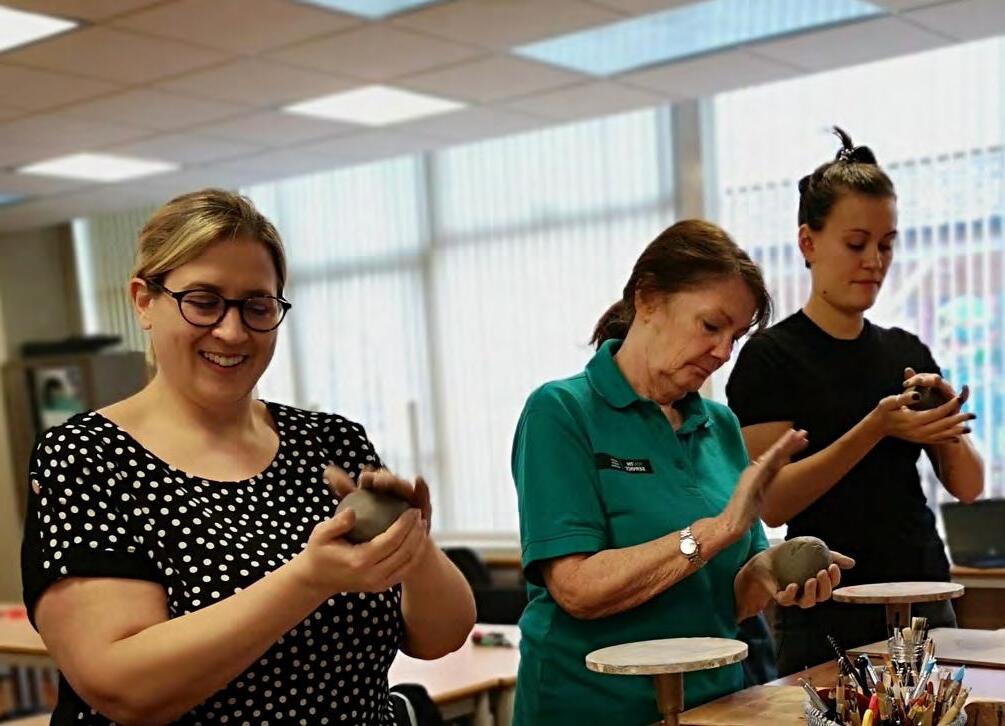Employer Toolkit
A Guide to Apprenticeships with ACL


A Guide to Apprenticeships with ACL

The off job training requirement does not mean an apprentice has to attend college one day per week. We use a blended approach which includes: online learning, research and project work, classroom sessions both physical and virtual, employer led activity and 1.2.1 sessions in the workplace
Thank you for choosing ACL as your apprenticeship delivery partner. We are the largest provider of Adult Education in Essex and the main Apprenticeship provider for Essex County Council.
Our apprenticeships are delivered to businesses and public sector organisations across the county and along its borders. We offer apprenticeships at intermediate, advanced and higher levels in a range of occupational sectors. Programmes are suitable for new entrants as well as existing staff that require new skills to support a promotion, change of job role or increased responsibility or have been identified as requiring development in their current position.
Programmes are designed to be as flexible as possible to meet the demands of a busy work place and will include a variety of delivery modes including: taught sessions at one of our 9 centres, distance learning through our virtual and digital learning platforms and 1.2.1 coaching sessions at the apprentice’s place of work.

Our end to end service includes: a fully supported recruitment service for employers wishing to take on a new employee as an apprentice dedicated account management to ensure the best outcome for both you and the apprentice professional and occupationally competent delivery team robust skills scans and training needs analysis to ensure the selected programme is right for you and the apprentice a fantastic range of add-on courses that support the apprentice and other employees
This guide has been designed to provide simplified information and guidance on all aspects of the apprenticeship journey with ACL. We hope you find it useful and look forward to working with you.

Kind regards, The Apprenticeship Team

acl.apprenticeships@essex.gov.uk

03330 139 502

Apprenticeships are not expensive. Whether you’re paying full cost from your levy or the 5% co-investment fee we believe that apprenticeships are great value for money. All of our programmes follow a rich curriculum that enables apprentices to not just learn something new but to embed and develop these skills to improve their performance at work. In some instances, grants are available to help with costs
The paperwork and process is not complicated and time consuming. Yes - there are a few things that you will need to sign and set up, but our team is on hand to guide you through every step of the way
Apprenticeships are not just for school and college leavers. Existing employees could be eligible and suitable for apprenticeships too – they are a great way to support individuals who require development, have changed roles, gained additional responsibilities or recently been promoted

Recruiting a new apprentice is not difficult. Our Business Development Team will work with you to help source a new team member – we use the National Apprenticeship Service, our digital channels and work with colleagues in Essex County Council to find the right person for your position.

We thought we’d dispel a few of the most commonly encountered apprenticeship myths – here are our top five!

Here’s a top line view of how it all works. We’ll go into a little more detail in the following pages and discuss fully when we meet with you.
You will discuss available options with a member of our Business Development Team (BDT) who will remain your main point of contact throughout the process

BDT will arrange for application forms to be sent to any existing employees looking to take up a programme and or send you a vacancy template to advertise your apprenticeship opportunity
If we’ve advertised your vacancy for you, we will send CVs and applications as agreed with you at the initial BDT meeting
Prior to starting, the applicant will complete an initial assessment, skills scan and interview with us which will determine their suitability & eligibility, and the cost and duration of the programme
If the apprentice is an existing employee, we will ask you to complete an employer skills scan to identify where you feel their areas for development are
We will carry out a Health and Safety check, ask you to sign a contract for supply of service and agree the cost of the programme and start date
We will arrange a date and time for the apprenticeship induction which will require both the line manager and apprentice to be present –at this meeting the tutor and line manager will set targets, agree the off job learning activity and ask all parties to sign the apprenticeship commitment statement
The tutor will agree a date with you for the initial review in four weeks’ time. This review enables the line manager, apprentice and tutor to discuss progress against targets and set new learning objectives. These reviews are carried out every 10 weeks and require both line manager and apprentice to be present – each meeting lasts approx. 60 mins
BDT will stay in contact with you regularly by phone and email and will arrange for contract meetings to ensure you are happy with everything we are doing
The apprentice attends agreed sessions, completes work on time and by their planned end date. Once all learning has been completed, we will book their End Point Assessment (EPA) - we will support you to select the most appropriate EPA Organisation
Before the apprenticeship commences there are a few things that we will need you to do. Our Business Development Team will explain what you need to do, and when, and will be on hand to provide support and answer any questions that you may have. All documents will be sent out by email using Docu-Sign.
We will:
need you to set up an account on the .Gov Apprenticeship Service https://accounts.manage-apprenticeships.service. gov.uk/
ask you to sign a contract with ACL confirming that you agree to and understand your responsibilities and obligations including compliance with the ESFA (Education & Skills Funding Agency) rules
carry out a Health & Safety Check on the apprentice’s place of work.
complete an Employer Agreement document with you which includes the financial arrangements and payment schedules
need you to provide us with a copy of your Employers Liability Insurance
want you to confirm that the apprentice has or will have a contract of employment in place on the first day of their programme
NB* The Contract and Health & Safety check need only to be completed once every three years irrespective of the number of apprentices you take on. If an incident occurs or significant changes happen in between times we may need to complete an additional Health & Safety Check to ensure the details held are up to date. Visit
The government have set maximum prices for each apprenticeship. The price you pay will depend on the occupational area, the level and any prior qualifications, knowledge, skills and behaviours that the apprentice already has – we use an initial assessment and skills scan to identify these.
Our Business Development Team will negotiate and agree a price with you for each apprenticeship undertaken. They will discuss how you will pay for the programme and support you to access and register your digital account and any funding you may be entitled to. Employers will pay for an apprenticeship in one of three ways:

Through their Apprenticeship Levy Account
1. Through Co-investment
2. Through gifting
3. For specific costs, please see page 15.
If you’re an employer with an annual pay bill over £3 million, each year you will pay into the apprenticeship levy. Payments will be added to a digital account which you then use to purchase apprenticeship training. The cost of the apprenticeship is divided across the number of months and is paid directly from your account to ACL on a monthly basis. Full details can be found at: https://www.gov.uk/guidance/pay-apprenticeship-levy
Most small and medium employers will pay for apprenticeship training through co-investment. This is currently 5% of the agreed apprenticeship price – the government will pay the remaining 95%. We will agree a payment plan with you before the apprenticeship starts.
The government will fully fund the apprenticeship training costs for employers employing fewer than 50 people if the apprentice is:
Aged between 19 and 24 years old and has either an EHC plan provided by their local authority; or has been in the care of their local authority
You will need to set up a digital account at the start of the recruitmnet process in order to access the apprenticeship funding.
Levy paying employers can gift up to 25% of their levy funds to support other businesses with the cost of apprenticeship training. The Essex Apprenticeship Levy Transfer Service can support businesses wishing to make or recieve a transfer. For more information please contact acl.businessdevelopment@essex.gov.uk
Every employer is entitled to a payment of £1000 for each apprentice taken on who is aged 16 – 18 or 19 -24 and has either an EHC plan provided by their local authority; or has been in the care of their local authority. This payment will be made by ACL and in 2 installments of £500. If the apprentice is aged 16 – 24 and is a care leaver they will also receive a payment of £1,000.
Apprentices can be paid the apprentice wage if they’re either: aged under 19 aged 19 or over and in the first year of their apprenticeship
Most employers pay above this rate and if they are an existing employee they would continue on their current rate of pay. Apprentices can receive salary increases at any point during their programme.
The employer is responsible for paying travel costs to any apprentice attending a taught session that is further away than their normal place of work.
Each apprenticeship has different components and will usually last between 12 and 24 months depending on the level taken and the apprentice’s prior knowledge, skills and behaviours.
Before an apprentice starts, they will be required to complete an Initial Assessment – this includes maths, English, sector skills scans and an interview with a member of the ACL Apprenticeship Team (if the apprentice is your current employee, we will also ask you to complete a skills scan to gauge the line managers perspective on their abilities). We will use this information to determine the content, price and duration of the programme - once agreed we will ask you to sign the Employer Agreement and the apprenticeship can commence.
Some apprenticeships have qualifications built into them whilst others are purely competency based. In some circumstance’s qualifications can be added to the programme for an additional fee to cover registration and exams (e.g. AAT)
The apprentice will have a dedicated tutor who will have responsibility for ensuring that all elements of the programme are delivered within the agreed timeframe and with the employer/line manager involved at each stage.
The main components of the apprenticeship are covered in the following sections.
Once a start date has been agreed for the apprentice, we will book their induction. The induction will take approximately two hours and the line manager will need to be present. At this meeting the tutor will: go through the set up of the apprentice’s Individual Learning Plan (ILP) discuss the content of the programme set some initial targets ask the line manager and apprentice to sign both the Apprenticeship Agreement and Commitment Statement
At the induction we will ask you to set some initial learning targets for your apprentice – the tutor will also set some.
Progress against these targets will be checked at the initial review - this will take place four weeks into the programme. The reviews then occur every 12 weeks. They last approximately one hour and are like a mini-appraisal. The tutor will spend time with both the apprentice and the line manager to:
track progress against previously set targets and objectives set new targets and objectives for the programme and the workplace
ensure off job learning is being met and recorded, and where necessary adapt the delivery plan to ensure the OJL hours are achieved.
check that the apprenticeship is on track as a whole answer any questions or concerns about the programme
This is the part of the programme where the apprentice acquires the new skills, knowledge and behaviours that make them occupationally competent. Our blended approach means that programmes are flexible and enable apprentices to experience a range of learning opportunities in a variety of formats. This means that not all apprentices are required to attend a weekly classroom session.
The Off Job Learning activity is calculated over the life time of the apprenticeship and could include:
A taught session at an ACL centre
An online tutorial or training session
A virtual or digital activity
A research project linked to the occupational area
Self-guided study (this includes remote tutor support)
Workshops and seminars
Attendance at conferences or trade shows
1.2.1 meetings with their tutor or line manager
Related industry training
Employer led training

Staff meetings or away days
Induction training
Essentially any activity that the apprentice undertakes where they are gaining new knowledge, skills or behaviours relating to the apprenticeship can be counted.
The tutor will show the apprentice how to record this.
At induction the Off Job Learning will be planned, and the detail agreed.
These core skills are an integral part of all apprenticeships. If an apprentice does not hold a recognised level 2 equivalent (C or grade 4 GCSE) or have their certificates to demonstrate their exemption they will need to undertake Functional Skills as part of their programme. Our Initial Assessment will indicate what level each apprentice is at and how long it is likely to take them to complete their qualifications.
Functional skills do not count towards the Off Job Learning. In some instances, we may recommend that the Functional Skills are completed before an apprenticeship is started. Functional skills test an individual’s understanding of every day maths and English. The qualification is delivered through a mixture of classroom, online and self-study resources. There are three exam components for English and one for maths.
Maths and English skills are embedded into every apprenticeship. Even if an apprentice doesn’t need to sit exams the tutors will ensure that they develop these skills further through contextualised learning and assessment.
NB* Not all previously attained maths and English qualifications will provide an exemption for Functional Skills – we will advise the apprentice and the employer/ line manager prior to the start of the programme if they will need to complete functional skills as part of their programme.
As part of their programme all apprentices will have the opportunity to undertake training to improve their digital skills. These are often in the form of workshops at one of our centres and can include things like: spreadsheets, word processing and photoshop.
We use virtual learning tools and an e-portfolio system to deliver and manage certain aspects of the apprenticeship. These will further support digital skills and give apprentices confidence in using a range of different systems and platforms.
To support apprenticeship delivery, we use various online and digital resources and platforms to enable a blended learning approach.
A few of these are listed below:
Virtual Learning Environment (VLE)
This is our own system where apprentices can access and complete online learning activities. These activities are set by their tutor and are aligned to their apprenticeship. There are various resources stored in the VLE that support units or elements of the programme being undertaken
Microsoft Teams and Hybrid delivery
These systems enable the tutor to ‘visit’ the apprentice remotely or carry out taught sessions/elements to a group through a virtual classroom
Learning Assistant
All apprentices will use our e-portfolio system to store their work and track their progress. As a line manager you will also have access to the system so that you can see the progress being made between progress review meetings
End Point Assessment (EPA) takes place at the end of the apprenticeship programme and is a comprehensive holistic assessment of the skills, knowledge and behaviours required as laid out in the apprenticeship standard. It is carried out by an External Independant Assessor and is generally made up of:
Portfolio of work - a mixture of written documents, audio and video evidence that showcases the professional application of on-programme learning
Online knowledge test - the learner showcases knowledge by answering a series of questions, explaining how they would respond to a range of different scenarios. Assessed via an online, on-demand test
Competency based interview - a one-to-one interview with the learner, using structured questions to test understanding and application of knowledge, and to assess their soft skills and behaviours
Professional discussion - the appointed EPA assessor leads a detailed discussion around the learners personal and professional development, looking for clear evidence of focused CPD and how this has been applied to improve performance in the workplace
Learners will receive a Pass, Merit or Distinction upon completion of the apprenticeship. If the result is a fail then a resit will be agreed with both learner and employer.
We have a duty to safeguard our learners and apprentices - this includes the Prevent Duty.
Safeguarding children is defined in Working together to safeguard children as:
protecting children from maltreatment preventing impairment of children’s health or development
ensuring that children are growing up in circumstances consistent with the provision of safe and effective care taking action to enable all children to have the best outcomes
Safeguarding vulnerable adults is defined in the Care and support statutory guidance issued under the Care Act 2014 as:
protecting the rights of adults to live in safety, free from abuse and neglect
people and organisations working together to prevent and stop both the risks and experience of abuse or neglect
people and organisations making sure that the adult’s wellbeing is promoted including, where appropriate, taking fully into account their views, wishes, feelings and beliefs in deciding on any action
recognising that adults sometimes have complex interpersonal relationships and may be ambivalent, unclear or unrealistic about their personal circumstances and therefore potential risks to their safety or well-being
Section 26 of the Counter-Terrorism and Security Act
2015 places a duty on certain bodies, listed in Schedule 3 of the Act, to have “due regard to the need to prevent people from being drawn into terrorism”.
These statutory bodies include:
Education
Health
Police
Full details of the Prevent Duty can be found in the link below and in our ‘Safeguarding and The Prevent Duty for Employers’ booklet. This booklet can be downloaded from our website – a hardcopy is also available.
https://www.gov.uk/government/publications/ prevent-duty-guidance
When your apprentice starts their programme you will be provided with information on all safeguarding policies and procedures including who to contact if you have any concerns.
If your apprentice does not turn up for work and does not make contact as per their terms and conditions of employment you must let ACL know on that same day.
If your apprentice does not turn up to an ACL learning session, we will let the line manager know.
If your apprentice needs to cancel a learning session, they need to let their tutor know in advance.
You must let us know when an apprentice is absent from work for more than one day (excluding the day of the incident) as a result of suffering personal injury or developing a disease/illness at the place of employment.
To report an absence please call us on 03330 130926.
What happens if my apprentice leaves or we no longer wish to employ them?
We would ask that you contact your Business Development Account Manager or the apprentice’s tutor as soon as possible. Where appropriate we will work with you and the apprentice to remedy any issues. If a resolution is not possible the tutor will continue to work with the apprentice to ensure they complete their programme. The Business Development Team will support the employer to source a new apprentice. The following will apply with regards to payments for the apprenticeship training.
If the apprentice leaves their employer prior to completion of their programme payments will cease at the point they are removed from the DAS (digital apprenticeship service) account.
If the apprentice leaves their employer prior to completion of their programme ACL will calculate the amount of co-investment received by the employer to the date the apprentice ceased employment. ACL will then, where required, invoice the employer for any underpayment of the co-investment or credit back any overpayment that ACL has received. Any underpayment is paid for by the employer and not the apprentice.
What happens if we no longer wish to continue with the apprenticeship?
We would ask that you contact your account manager in the first instance. There may be a financial penalty for withdrawing an apprentice early from the programme.
Further details can be found in the apprenticeship contract and within our fee policy.
What happens if we experience any problems or concerns?
We hope that your experience with our apprenticeship provision is a positive one. If at any point throughout the programme you are not happy, encounter a problem or are concerned we would ask you to speak to either the tutor or your Business Development Account Manager in the first instance. They will direct you to our complaints procedure if required.
ACL can also offer a wide range of courses and programmes outside of apprenticeships. These can be used to develop skills to support job roles or for personal development.

Programmes include:
Certificate in Coaching & Mentoring
AAT (Association of Accounting Technicians)
SAGE Essentials
Team Leading & Management
Customer Service
Microsoft Office
Photoshop
Maths, English, Biology, Computer Science
GCSE’s
Access to Higher Education Diplomas
Dementia Awareness
Infection Control
End of Life Care
Support Work in Schools
Mental Health Recovery
Resilience
Please talk to your Business Development Account Manager to discuss any training needs that you may have – if we can’t offer it, we’ll know someone that can!
Full details of all courses can be found on our website www.aclessex.com
Mindfulness
Counselling
Housekeeping
Hospitality
British Sign Language
Makaton
ESOL (English for Speakers of Other Languages)
Modern Foreign Languages including:
Spanish, French, Japanese, Greek, German, Italian
Creative & Cultural including:
Photography, Floristry, Painting, Silversmithing, Pottery, Textiles
Hairdressing & Barbering
Beauty & Complementary Therapies
Sports Massage
Spend valuable time away from the workplace with your team at one of our centres or outreach venues. Content can be tailored to business need.
Contact us
Accounts or Finance
Assistant Level 2
Customer Service
Practitioner Level 2
Public Service
Operations Delivery Officer Level 2
*Coming Soon
Assistant Accountant Level 3
Business Administrator Level 3
Customer Service
Professional Level 3
Payroll Administrator Level 3 *Coming Soon
Team Leader or Supervisor Level 3
Associate Project Manager Level 4
Professional Accounting Technician Level 4
Schools Business Professional Level 4
Coaching Professional Level 5
Operations or Departmental Manager Level 5
Adult Care Worker Level 2
Healthcare Cleaning
Operative Level 2
Healthcare Science
Assistant Level 2
Healthcare Support Worker Level 2
I.T. & Digital
Digital Marketer Level 3 *Coming Soon
I.T. Solutions Technician (Software) Level 3
I.T. Solutions Technician (Hardware) Level 3
Junior Content Producer Level 3
*Coming Soon
Cyber Security Technician Level 3
*Coming Soon
Laboratory Technician Level 3
*Coming Soon
Lead Adult Care Worker Level 3

Senior Healthcare Support Worker Level 3
Lead Practioner in Adult Care Level 4
Leader in Adult Care Level 5
Early Years Practitioner Level 2
Early Years Educator Level 3
Learning Mentor Level 3 *Coming Soon
Teaching Assistant Level 3


Assessor Coach Level 4
*Coming Soon
Children, Young People & Families Practitioner (Community) Level 4

*Coming Soon
Children, Young People & Families Practitioner (Residential) Level 4
Children, Young People & Families Manager (Community) Level 5
*Coming Soon
Details of these courses can be found on our website
acl.apprenticeships@essex.gov.uk


03330 139 502
ACL Basildon Churchill Avenue, Broadmayne, Basildon, SS14 3SG
ACL Chelmsford Beeches Close, Chelmsford, CM1 2SB
ACL Brentwood Bishops Hill, Rayleigh Road, Hutton, Brentwood, CM13 1BD
ACL Clacton St Osyth Road, Clacton, CO15 3BN
ACL Colchester Wilson Marriage, Barrack Street, Colchester, CO1 2LR
ACL Harlow Harlow Library, The High, Harlow, CM20 1HA
ACL Maldon Carmelite House (above the library), White Horse Lane, Maldon, CM9 5FW
ACL Witham Spinks Lane, Witham, CM8 1EP
ACL Rayleigh 132/4 High Street, Rayleigh, SS6 7BX
Published January 2023